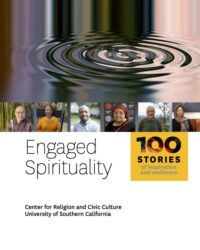News coverage of religion can be cynical, focusing on corruption, abuse and the negative elements of religion as a crutch or escape from reality. With this project, CRCC aimed to introduce into the media landscape stories in which religion and spirituality are a force for positive social change.
We were interested in why someone would heroically commit themself to a life of radical engagement with issues of justice and equity, oftentimes at a considerable cost to their own comfort.
We found that journalists were likewise interested in telling such stories. More than 350 journalists from around the world applied to be a part of the project. CRCC worked with 33 journalists over the course of the project, including two writer-photographer pairs, two video producers, and The Spiritual Edge podcast’s editorial team. In addition to US-based journalists, the project’s fellows lived in Brazil, Guatemala, Mexico, India, Indonesia, Israel, Georgia, Germany, England, Spain and Nigeria.
The journalists also were attracted to the project by the financial support it offered. Our deal with the journalists was that we would pay their travel costs as well as an honorarium for their work, and they, in turn, would provide audiotapes of their interviews with the “spiritual exemplar,” so our research team could analyze them for academic publications.
The financial award allowed the journalists to produce “good journalism,” as one fellow described it. Although the COVID-19 pandemic limited travel and in-person access to their subjects, many journalists spent multiple days with the exemplar, interviewing and observing the individual’s work and their community in some depth. They defined their work as ethnographic journalism, literary journalism or even “spiritual journalism,” which speaks to the personal impact reporting such stories can have on the journalists themselves.
The USC research team also did profiles of exemplars in Sudan, Uganda, Malawi, Congo, Egypt, Lebanon, France and the United States, which gave them first-hand experience of some of the challenges and inspiration of encountering exemplary humanitarians.
In our orientation meeting with the journalists, we stressed that we were not interested in putting exemplars on a “saintly” pedestal. We wanted well-rounded profiles that would also include the shadow side of exempars’ work, including burnout, vicarious trauma because of their exposure to human suffering, loneliness and costs to their families and friends.
Like the lives of the exemplars themselves, the stories emerging from this project are anything but Polly-Annish. They are filled with tragedy and trauma, and grapple with the evils of torture, genocide, abuse, inequality and discrimination. At the same time, aligning with the trend of solutions journalism, these stories present people working to address and solve their communities’ most critical issues. And indeed, the solutions that these exemplars seek to implement are grounded in their spirituality—in a belief in human dignity, an understanding of karma or a value of gratitude, for instance.
Such complex stories are difficult to tell in 800 words, and pitching remained a challenge for many of our fellows. Nonetheless, articles have been published in the New York Times, Guardian, Al Jazeera, Christian Science Monitor, America: The Jesuit Review, Harvard Divinity Bulletin, various online publications and other venues. We are grateful to Religion News Service and Religion Unplugged for their partnership in helping these stories reach their audiences.
